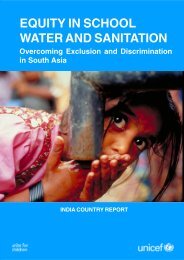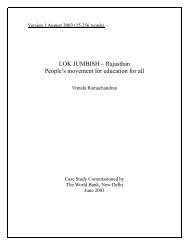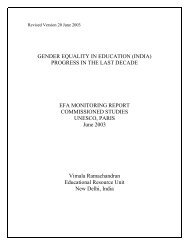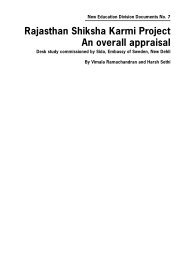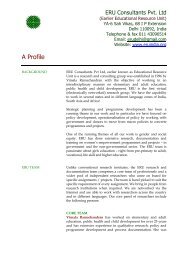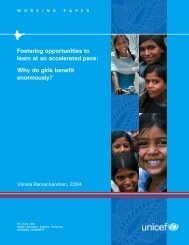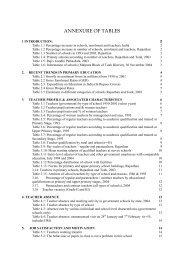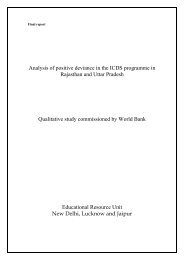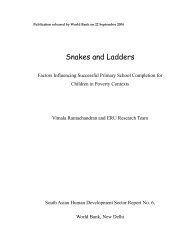primary school teachers the twists and turns of everyday practice
primary school teachers the twists and turns of everyday practice
primary school teachers the twists and turns of everyday practice
You also want an ePaper? Increase the reach of your titles
YUMPU automatically turns print PDFs into web optimized ePapers that Google loves.
Version 20 Oct 08, edited final<br />
The Hoshangabad Science Teaching Programme (HSTP) in Madhya Pradesh was<br />
started by Kishore Bharati <strong>and</strong> Friends Rural Centre in 1972 with 16 <strong>school</strong>s in<br />
Hoshangabad district <strong>and</strong> was extended to all middle <strong>school</strong>s in MP in 1978. Eklavya<br />
was set up in 1982 <strong>and</strong> it took up a science-teaching programme in 1,000 <strong>school</strong>s; <strong>the</strong><br />
programme continued for 20 years until <strong>the</strong> government shut it down in 2002. As <strong>the</strong><br />
programme started taking root it became evident that it could not succeed unless <strong>the</strong><br />
<strong>teachers</strong> <strong>the</strong>mselves were convinced about <strong>the</strong> need for change. This was indeed a<br />
tall order because <strong>school</strong> <strong>teachers</strong> are isolated from <strong>the</strong> world <strong>of</strong> knowledge, <strong>the</strong><br />
world <strong>of</strong> enquiry <strong>and</strong> <strong>the</strong> world <strong>of</strong> science. The first challenge faced by HSTP was to<br />
encourage <strong>teachers</strong> to open up, speak out <strong>and</strong> be uninhibited <strong>and</strong> natural even in <strong>the</strong><br />
presence <strong>of</strong> <strong>the</strong>ir administrative superiors. Teachers’ self-perception as government<br />
functionaries at <strong>the</strong> bottom <strong>of</strong> <strong>the</strong> education ladder coupled with very little exposure<br />
to science <strong>and</strong> ma<strong>the</strong>matics was a big barrier. As in <strong>the</strong> HBCSE experience, once <strong>the</strong><br />
process was underway <strong>and</strong> <strong>teachers</strong> began engaging with <strong>the</strong> learning process, <strong>the</strong>ir<br />
self-esteem <strong>and</strong> confidence grew <strong>and</strong> <strong>the</strong>ir self-perception changed dramatically<br />
(Mukherjee 2007; Science Today December 1977).<br />
Box 2.6: What HSTP was confronted with in 1972<br />
The HSTP initiative was a response to <strong>the</strong> challenge posed by <strong>the</strong> conditions <strong>the</strong>n<br />
prevalent in government <strong>school</strong>s <strong>and</strong> which unfortunately continue to be true in large<br />
measure even today. These may be summarised as:<br />
⇒ A <strong>school</strong>, in a rural area or non-privileged area in towns <strong>and</strong> cities, is characterised<br />
by <strong>the</strong> fact that its building is poorly constructed, that it has no library, no<br />
laboratories, no equipment <strong>and</strong> no facilities. The teaching <strong>of</strong> science is usually done<br />
without performing any experiments <strong>and</strong> comprises a body <strong>of</strong> received knowledge<br />
being transmitted to children, validated by <strong>the</strong> authority <strong>of</strong> <strong>the</strong> textbook <strong>and</strong> <strong>of</strong> <strong>the</strong><br />
teacher, who brooks no questioning.<br />
⇒ Teachers are <strong>of</strong>ten untrained in science. They have no resources <strong>and</strong> enjoy no<br />
support from <strong>the</strong> system. They make no inputs to <strong>the</strong> curriculum <strong>and</strong> yet are<br />
expected to be <strong>the</strong> repositories <strong>and</strong> source <strong>of</strong> all knowledge. It is not surprising <strong>the</strong>n<br />
that <strong>the</strong>y adopt authoritarian modes <strong>of</strong> teaching.<br />
⇒ Children are docile <strong>and</strong> submissive. This is almost a cultural imperative, one that<br />
dictates that elders have to be respected <strong>and</strong> <strong>the</strong>ir authority is never to be<br />
questioned. There are no rewards for showing initiative <strong>and</strong> independent enquiry<br />
by children is suppressed in <strong>the</strong> name <strong>of</strong> maintaining discipline in <strong>the</strong> class.<br />
(Source: Dr. Vijay S. Varma, available at: http://www.icrindia.org/?page_id=52).<br />
Subir Shukla, who has been closely associated with teacher development<br />
programmes <strong>of</strong> <strong>the</strong> government in DPEP <strong>and</strong> later with some state governments said<br />
that a bitter lesson that <strong>the</strong>y learnt in <strong>the</strong> DPEP days was that <strong>the</strong>re is an attitudinal<br />
hierarchy <strong>of</strong> learning. ‘When we work with <strong>teachers</strong>, <strong>the</strong> first attitude that changes is<br />
about himself/herself. When <strong>the</strong>y are able to break out <strong>of</strong> <strong>the</strong> low self-image, <strong>the</strong>y<br />
realise that children are capable <strong>of</strong> learning. They realise poor children can also<br />
learn, children from deprived social groups can learn <strong>and</strong> <strong>the</strong>y also come to believe<br />
that girls can learn. Teachers do not always have <strong>the</strong> emotional security to learn,<br />
<strong>the</strong>refore at each stage we have to give <strong>the</strong>m <strong>the</strong> inner strength to move to <strong>the</strong> next<br />
stage. Self-image is critical, it is an issue <strong>of</strong> identity <strong>and</strong> when we tell <strong>the</strong>m <strong>the</strong>y do<br />
not know teaching <strong>the</strong>y switch <strong>of</strong>f’ (interview with Subir Shukla, July 2008).<br />
27



